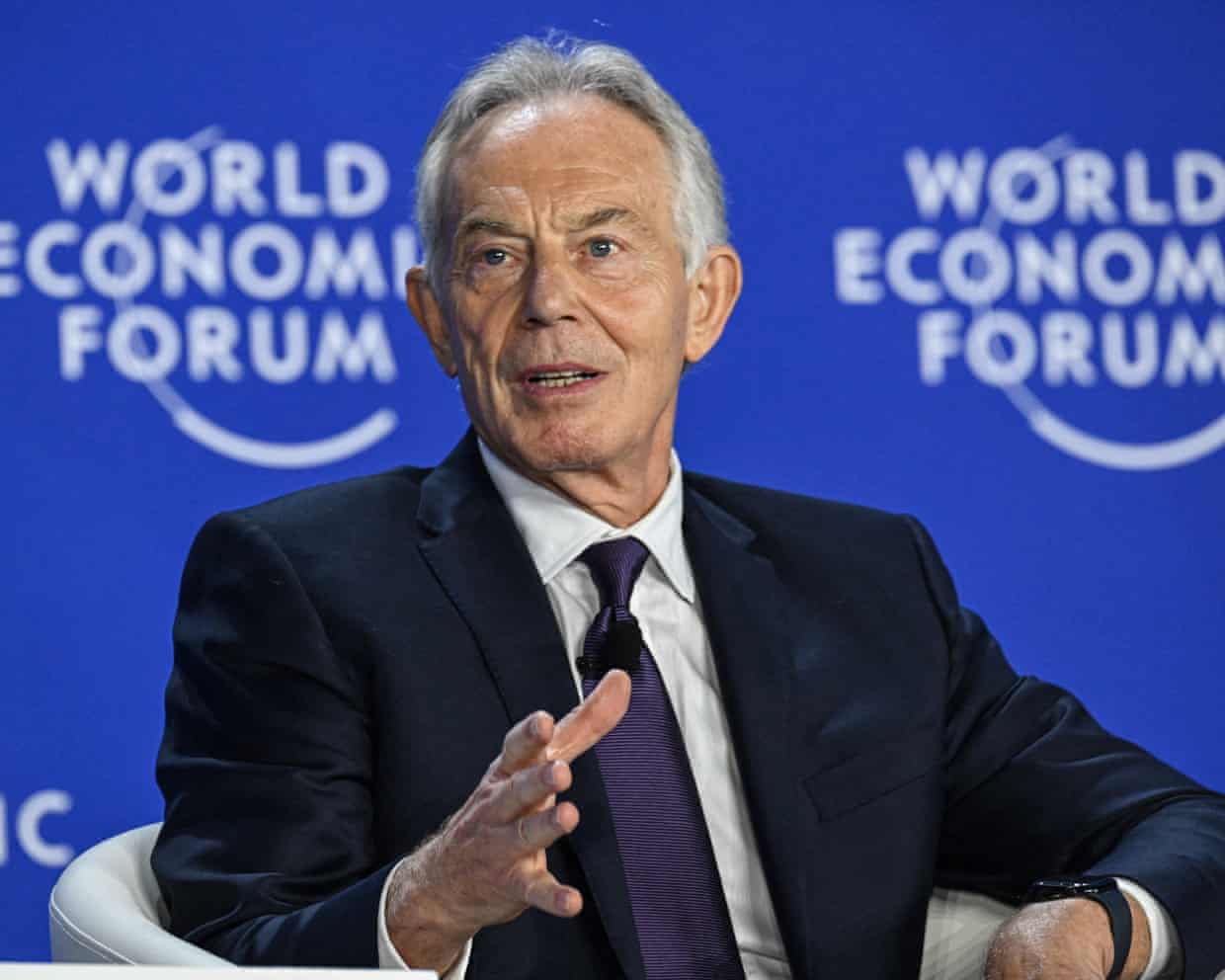‘History won’t forgive us’ if UK falls behind in quantum computing race, says Tony Blair

Tony Blair has said “history won’t forgive us” if the UK falls behind in the race to harness quantum computing, a frontier technology predicted to trigger the next wave of breakthroughs in everything from drug design to climate modelling.The former British Labour prime minister, whose thinktank and consultancy, the Tony Blair Institute, is backed by tech industry leaders including the Oracle founder, Larry Ellison, warned: “The country risks failing to convert its leadership in quantum research.”In a report calling for a national strategy for quantum computing, Blair and William Hague, a former Conservative party leader, compared the situation to the recent history of artificial intelligence, where the UK was responsible for important research breakthroughs but then ceded power to other countries, including the US, leading to a scramble to build “sovereign” AI capacity.“As we have seen with AI, a strong research and development base is not enough: it is the countries that have the infrastructure and capital for scale that capture technology’s economic and strategic benefits,” they said.“While the UK is home to the second highest number of quantum startups in the world, it lacks the necessary high-risk capital and infrastructure to scale those startups.
”Quantum computing differs from classical computing in strange and mind-bending ways,In a standard computer, information is represented through transistors being on or off: ones or zeros,In quantum mechanics, things can be in multiple places at the same time,A transistor can be on and off at the same time, in a phenomenon known as quantum superposition,The effect is to create such a massive increase in computing power that a single quantum computer could, in theory, take on a task that would require billions of the most powerful supercomputers.
The science is not yet at a stage to prove useful on a widespread basis, but the potential for simulating molecular structures to create new materials and drugs is enormous.The value of quantum computing, when it arrives in a usable form, has been estimated at nearly $1.3tn alone to the chemicals, life sciences, automotive and finance industries.Fears centre on the potential for super-powerful quantum machines to break all encryption exposing national infrastructure to cyber-attacks.“The quantum era will arrive whether Britain leads it or not,” Blair and Hague said.
“But history will not forgive us if we again fumble the chance to lead a transformative technology.”The warning comes after the Cambridge-educated Briton John Clarke won the 2025 Nobel prize in physics for his work into quantum computing science, and as UK quantum firms continue to be bought up by US companies.In June, a spinout quantum company from Oxford University, Oxford Ionics, was sold for $1.1bn to the US company IonQ.Meanwhile, PsiQuantum, a spinout from Bristol University and Imperial College London, grew mostly in California after finding investors there most enthusiastic, and its first large-scale quantum computer will be built in Brisbane, Australia.
A report from the Tony Blair Institute for Global Change critical of the UK’s current quantum strategy warns that not only are China and the US “racing ahead” but Germany, Australia, Finland and the Netherlands are also making big strides.A government spokesperson said: “Quantum is a gamechanging technology with the potential to overhaul everything from healthcare, to our access to affordable clean energy.The UK already ranks second globally for quantum investment, and we have world-leading strengths in the supply chain in areas such as photonics – but we are determined to go further.They said: “We have provided a first-of-its-kind 10-year funding commitment for the National Quantum Computing Centre.We will be setting out plans for other areas of our national programme in due course.
”In June, Labour announced £670m to accelerate the application of quantum computing as part of its industrial strategy to create new drugs for incurable diseases and better carbon capture technologies.The best public interest journalism relies on first-hand accounts from people in the know.If you have something to share on this subject, you can contact us confidentially using the following methods.Secure Messaging in the Guardian appThe Guardian app has a tool to send tips about stories.Messages are end to end encrypted and concealed within the routine activity that every Guardian mobile app performs.
This prevents an observer from knowing that you are communicating with us at all, let alone what is being said,If you don't already have the Guardian app, download it (iOS/Android) and go to the menu,Select ‘Secure Messaging’,SecureDrop, instant messengers, email, telephone and postIf you can safely use the Tor network without being observed or monitored, you can send messages and documents to the Guardian via our SecureDrop platform,Finally, our guide at theguardian.
com/tips lists several ways to contact us securely, and discusses the pros and cons of each.

NHS hospitals to test AI tool that helps diagnose and treat prostate cancer
A tool that uses artificial intelligence to help diagnose men with prostate cancer and guide decisions about treatment is to be tested in NHS hospitals, researchers have announced.The £1.9m Vanguard Path study, funded by Prostate Cancer UK and led by researchers at the University of Oxford, is expected to last three years and will test an AI tool called the ArteraAI Prostate Biopsy Assay. In total, biopsies from more than 4,000 men will be used.The tool, which analyses digitised biopsy images to produce a personalised risk score, has already been shown in clinical trials to identify which men with high-risk prostate cancer would be most likely to benefit from the drug abiraterone

Why we must tackle the crisis in end-of-life care | Letters
Your editorial on hospices (29 October) was right to highlight the crisis in end-of-life care. As the National Audit Office’s report makes clear, unless urgent action is taken, the system will be overwhelmed. More than 5.75 million deaths are expected in the next decade, and over 5 million of those people will need palliative care. Too many face dying in avoidable pain, in poverty and alone

Why Reeves should gamble on tax hikes | Brief letters
Betfred has said it would close all 1,287 of its high street betting shops if Rachel Reeves raises taxes on the industry (Betfred says gambling tax rise in budget will force it to shut all its UK shops, 19 October). What further encouragement can she need?John SaxbeeHaverfordwest, Pembrokeshire As great as Prunella Scales’s character was, I never really cared for Fawlty Towers (Obituary, 28 October). But I did care that she was at the launch of the Anti‑Nazi League back in the day, which helped to sweep the fascist National Front off our streets. Pete HendyHigh Wycombe, Buckinghamshire If Trump changes the constitution to allow him to run for a third term, wouldn’t that also open the door for Barack Obama to run again (The US politics sketch, 2 November)?Hilary BirdKilndown, Kent Re Melanie White’s letter about dogs on sofas (Letters, 30 October), try telling that to our snuggle‑loving whippet. She’ll be saying they shouldn’t be allowed on the bed next

A fatal drop: what do we know about the drugs, 500 times stronger than heroin, taking Australian lives?
Only a few years after first being detected in Australia, nitazenes have been found in everything from vapes to fake heroin – and the death toll is risingFollow our Australia news live blog for latest updatesGet our breaking news email, free app or daily news podcastIn the middle of winter last year, in a unit in Melbourne’s northern suburbs, Carly Morse, Thomas Vale, Michael Hodgkinson and Abdul El Sayed used a rolled-up bank note to inhale cocaine. About 3am on 24 June 2024, all four likely became unresponsive.El Sayed’s uncle, Cory Lewis, became concerned late the following night when his nephew, who had been living with him, did not return home.He banged on the door of the unit but there was no answer. A reflective tint on a side window meant he could not see inside, so Lewis jumped a fence and went to the back of the unit

Tired all the time? There may be a simple reason for that
Levels of fatigue among women in Britain are soaring, and this isn’t the kind that can be cured by a nap. What lies behind the exhaustion epidemic?Look around you and it isn’t hard to find an exhausted woman. There she is, standing behind you in the queue at the post office or delivering your Amazon package. Here she is at the school gates, puffing after running from the car, coffee in hand, apologising for forgetting to pack a PE kit. Or trying to stop a yawn escaping during a long work meeting

How scientists are shining light on the biology behind seasonal affective disorder
Researchers tracking large cohorts are discovering the effects of sleep, light and therapy on people impacted by winter’s arrivalFor some, the darkening days of autumn bring more than the annual ritual of reviving woolly jumpers and turning on the central heating. As the evenings close in and the mornings grow murky, energy ebbs and a heavy sadness settles in.Although seasonal affective disorder (Sad) was only formally recognised by psychiatrists in the 1980s, the link between the seasons, mood and vitality has long been observed.The Yellow Emperor’s Classic of Medicine – a Chinese text from roughly 300BC – described how the seasons affect all living things. It advised that in winter, one should “retire early and get up with the sunrise”, keeping “desires and mental activity quiet and subdued, as if keeping a happy secret”

Safety of train users and staff is paramount | Brief letters

UK factories return to growth after JLR restarts operations; US manufacturing exports hit by tariffs – as it happened

UK economy ‘doomed’ under Labour, says Ryanair chief

Kimberly-Clark to buy Tylenol maker Kenvue in landmark $40bn merger

Nearly 90% of jobseekers unable to get long-term work despite millions spent on private job agencies

Jaguar Land Rover restart helps UK factories return to growth